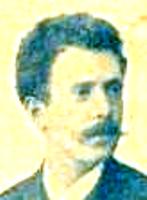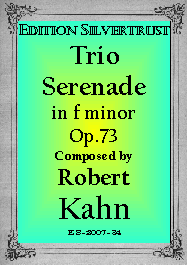Presents
Robert Kahn
|
Oboe, Horn And Piano
|
Violin, Horn And Piano
|
 |
Oboe, Viola And Piano
|
Clarinet, Cello And Piano
|
Clarinet, Horn And Piano
|
Trio Serenade in f minor, Op.73
For 9 Different Trio Ensembles--all with Piano--See Below
 Robert
Kahn (1865-1951) was born in Mannheim of a well-to-do banking family. He began
his studies at the Hochschule für Musik in Berlin. There, he got to know and
became friends with Joseph Joachim who was the director. It was through both
Joachim and his own family that he had a chance to get to know Brahms, who was
so impressed with Kahn that he offered to give him composition lessons. However,
Kahn was too overawed to accept. Nevertheless, Brahms did help Kahn informally,
and while Kahn's work does, to some extent, show the influence of Brahms, he is
an eclectic and independent composer whose music has its own originality. After
finishing his studies in Berlin, Kahn, on Brahms' suggestion, went to Munich to
study with Joseph Rheinberger. After completing his own studies, he worked for a
while as a free lance composer before obtaining a position at the Hochschule in
Berlin where he eventually became a professor of piano and composition.
Robert
Kahn (1865-1951) was born in Mannheim of a well-to-do banking family. He began
his studies at the Hochschule für Musik in Berlin. There, he got to know and
became friends with Joseph Joachim who was the director. It was through both
Joachim and his own family that he had a chance to get to know Brahms, who was
so impressed with Kahn that he offered to give him composition lessons. However,
Kahn was too overawed to accept. Nevertheless, Brahms did help Kahn informally,
and while Kahn's work does, to some extent, show the influence of Brahms, he is
an eclectic and independent composer whose music has its own originality. After
finishing his studies in Berlin, Kahn, on Brahms' suggestion, went to Munich to
study with Joseph Rheinberger. After completing his own studies, he worked for a
while as a free lance composer before obtaining a position at the Hochschule in
Berlin where he eventually became a professor of piano and composition.
The Trio Serenade has a very interesting history. When Kahn submitted it to his publisher Simrock, it was a trio for Oboe, Horn & Piano. Simrock took one look at it and told Kahn he would never sell more than a few copies if that were the only combination by which the work could be played. He told Kahn point blank that he would not publish it unless he made at least a version for standard piano trio. Kahn, who apparently was very fond of this work, did Simrock one better---he wrote the Serenade so that it could be played by 9 different ensembles! In a post-Brahmsian idiom, the lovely Trio Serenade is, unlike Brahms' own serenades, in one continuous substantial movement. It does, however, consist of two alternating parts, each with its own middle section or trio. The first part is a genial and relaxed Andante sostenuto which has for its trio section a lively Vivace. The second part consists of an Allegretto non troppo e grazioso, not terribly fast but elegant. It too has a faster middle section.
Long out of print, we are pleased to make this fine work available in all 11 trio versions. An entire set of 7 parts (violin, viola, cello, oboe, clarinet, horn & piano), which will allow you to play it in any of the 9 versions, is also available.